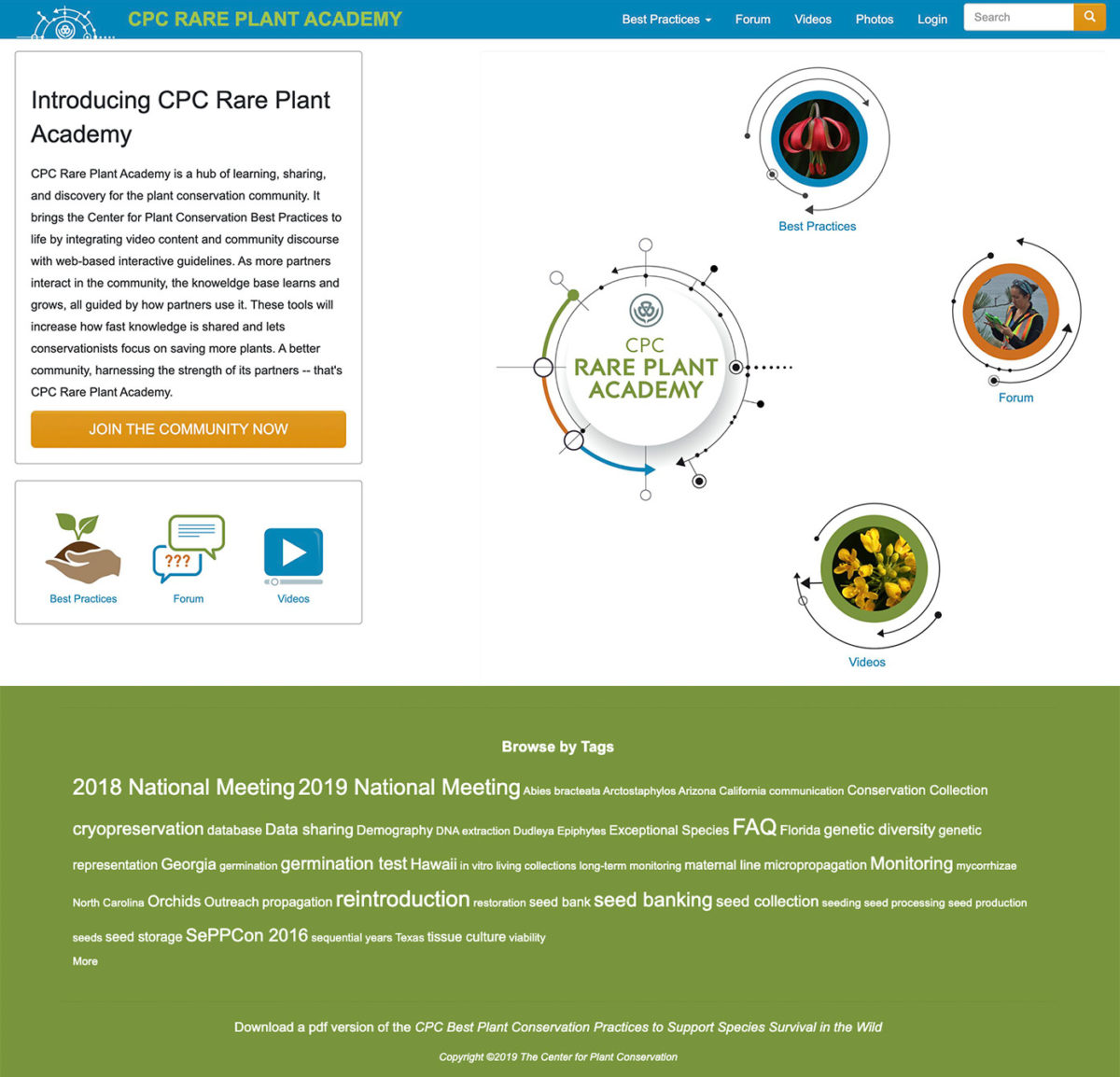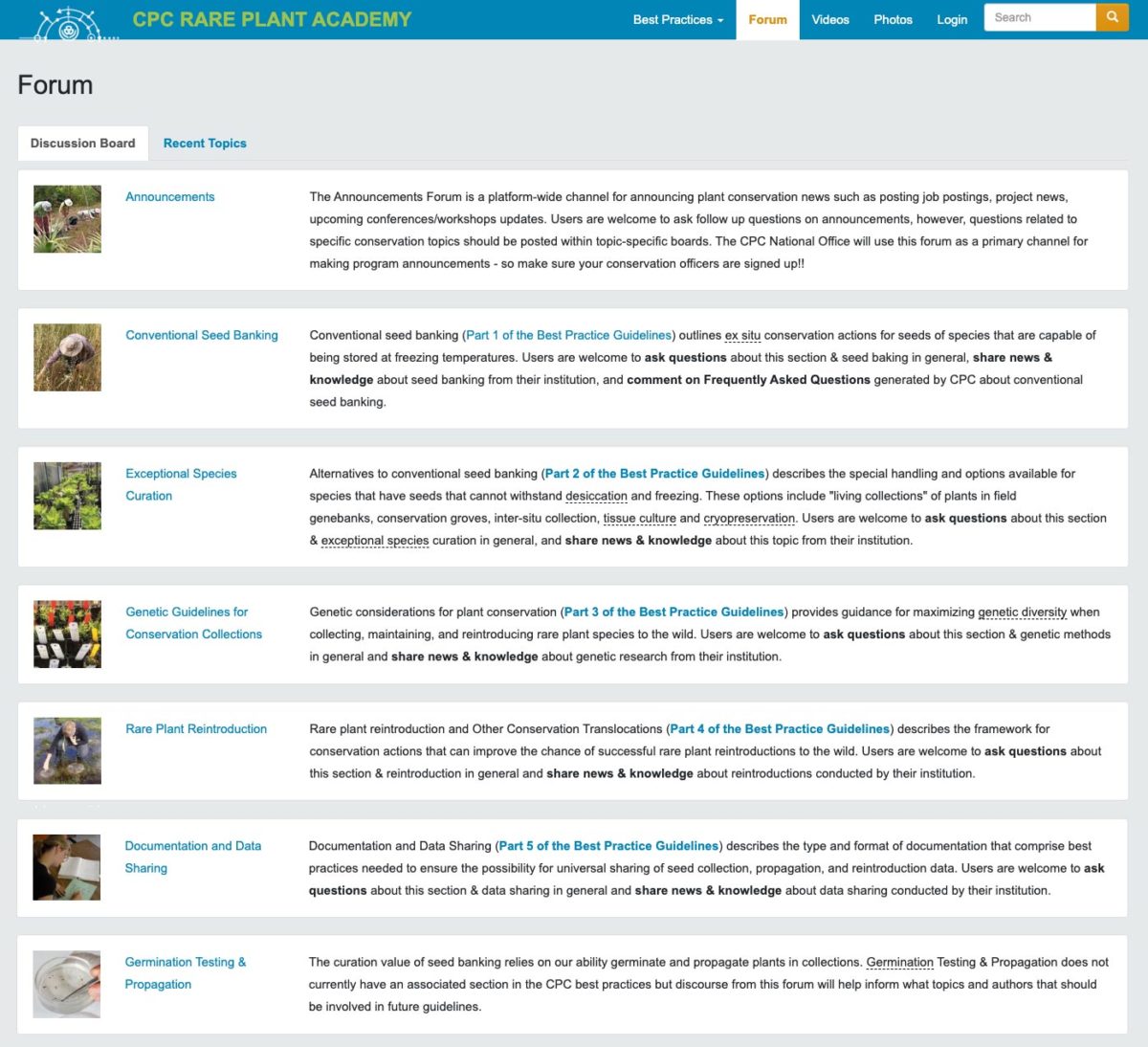Welcome to the Academy
a·cad·e·my
/əˈkadəmē/
noun
1. a place of study or training in a special field.
“a police academy”
2.a society or institution of distinguished scholars and artists or scientists that aims to promote and maintain standards in its particular field.
“the National Academy of Sciences”
In applying to the Institute of Museum and Library Services’ National Leadership Grant two years ago, the Center for Plant Conservation had the grand aim of bringing the professional experience and comradery of the CPC Network to the internet. To build a central online location where plant conservation professionals can find key resources and step-by-step guidelines for conserving plants, but also ask colleagues directly about the (vast) unknown and practical pieces of enacting conservation. A year and a half into the grant, we have made great progress and are excited to make the online platform more widely available – reaching beyond the established CPC Network to our partners and potential partners, to the landowners, consultants, non-profits, and new practitioners all working to save plants. We are now welcoming everyone to join the academy – the CPC Rare Plant Academy.
Academy has two primary definitions – and both apply to the online platform CPC has built. First, it is a place of study and training in the practice of plant conservation. Currently the primary study material is the newly updated CPC Best Plant Conservation Practices to Support Species Survival in the Wild (hereafter, Best Practices), but a growing library of instructional videos and other resources also provide valuable instruction to conservationists. Second, the platform is a place for the CPC network to come together and share their experiences – positive and negative – to promote, maintain, and determine new standards in the field of plant conservation. Network partners and other practitioners face new challenges, many not yet addressed in guidelines, everyday. The online platform provides a place for people to query peers and learn from their experiences. The platform is both a center of learning and a central node for our professional society, a Rare Plant Academy.
Expect the Rare Plant Academy to continue to evolve – not just in content (which we hope to be continuous) – but in format. But it is now in a place where we are happy to grow its audience and share with all concerned for rare plants. Getting it to this point was not always easy. Building an online community is a bit like throwing a karaoke party and hoping that people are willing to sing. Not everyone is comfortable sharing their doubts or questions publicly, especially in a community of professional peers. We are trying to emphasize the importance of capturing conservation discourse in a public forum, because our community and the rare plants cannot afford to repeat each other’s mistakes. We also hope that expanding the community beyond the professional network will create a critical mass for increased engagement.

We hope the current guidelines and content will draw people in, and therefore getting them into a more digestible format was a priority this past year. Though guidelines were published in pdf and physical formats last year, converting them from a print format to the web platform took more than using the “copy” and “paste” shortcuts on the keyboard. While long uninterrupted paragraphs are common in books, people are accustomed to digesting website information in short snippets. After all, not much more than 100 words can fit on a smart phone screen at any one time. But finding the balance in presenting all the guidelines for an activity in the same place and fitting within the format of the web has paid off. Only 100 hard copies of the guidelines were published, and the pdf has been downloaded hundreds of times, but since adding all chapters of the guidelines to the site in July, hundreds of individuals have been able to access the guidelines each month. People are finding the guidelines organically through web searches. Not necessarily aware of the CPC and the resources it offers, these people have questions about rare plants and are finding them on our platform.

As we expand participation in the Academy, we hope content to grow naturally, especially through the forums. However, we are also making a push this year to grow our video content. Developing useful, educational video content for the conservation community is challenging because of the technical nature of what we do. We want our videos to be short and succinct enough to provide an overview for students and newcomers, but detailed enough that they can provide a useful starting point for conducting actual conservation activities like germination testing, collecting by maternal lines, or planting in a riparian system. We are working with gardens in our story boarding and video production, as well as with professional content producers to bring a variety of content to those thirsty for knowledge.
And we know there are many people out there thirsty for knowledge in how to conserve rare plants and we are excited for them to join the CPC Rare Plant Academy. By growing as a society of professionals, we grow as a resource and place of study, so please share with anyone you know who is interested in saving plants.